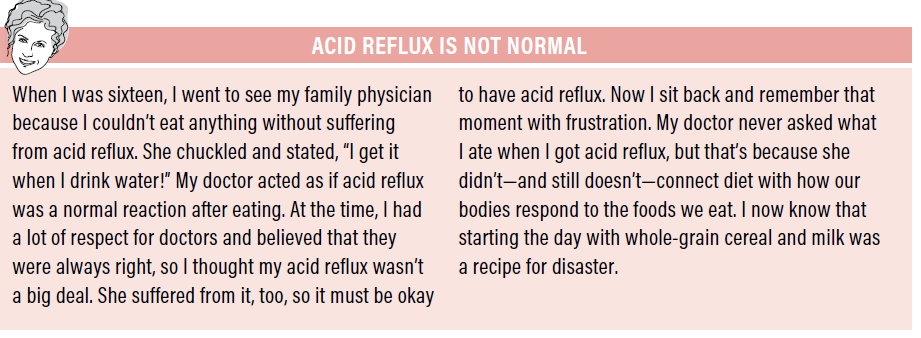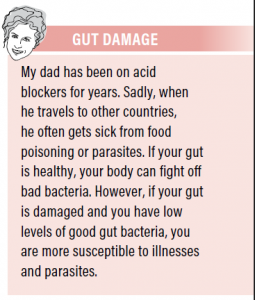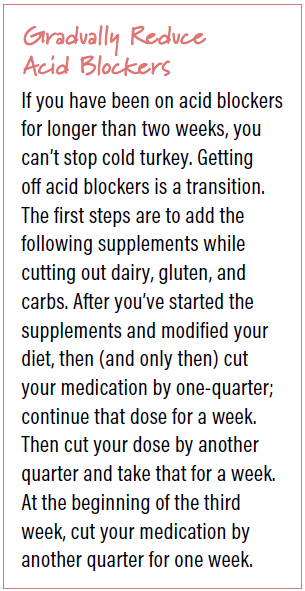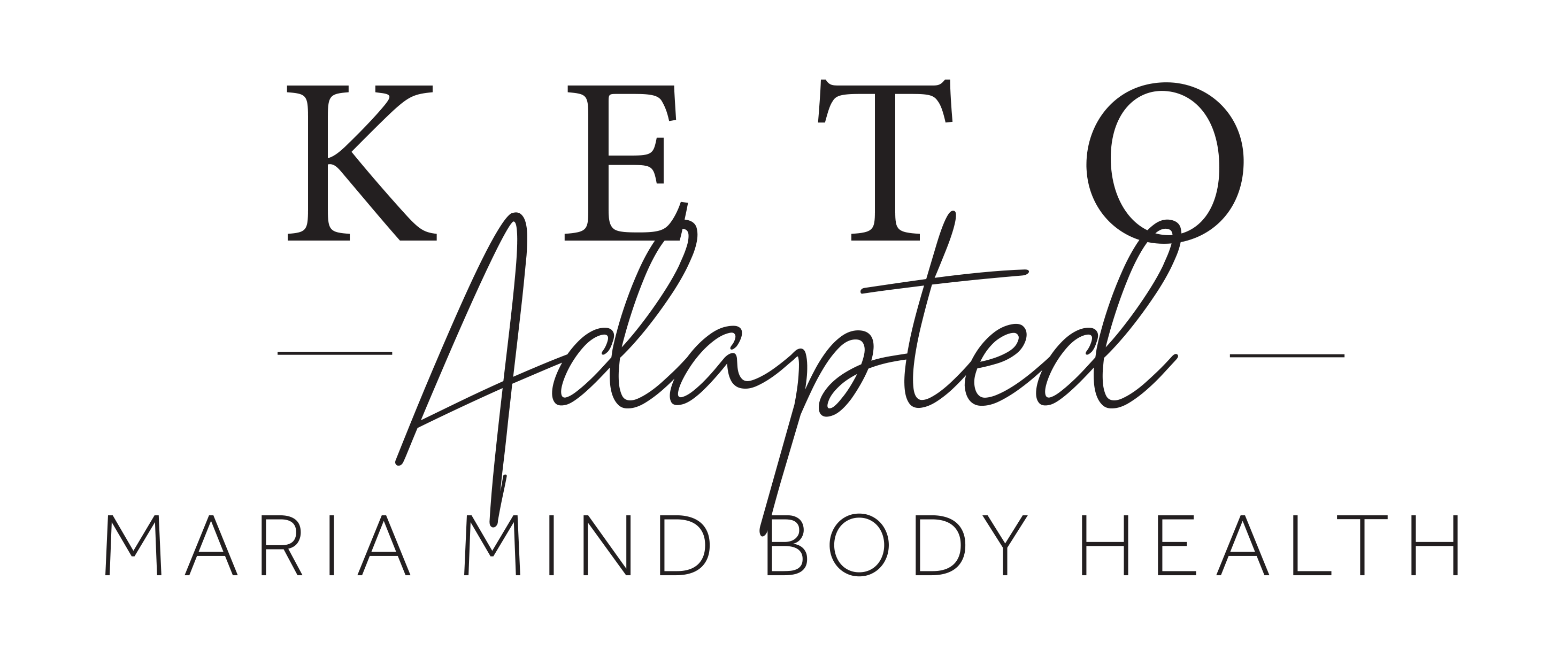Your cart is currently empty!
IBS, Acid Reflux and GI Issues
We can’t help but notice that everywhere we turn we see acid blocking medications being sold. Prescription drugs for acid reflux have serious consequences, and the directions clearly state that they are not to be used for longer than two weeks. However, they are sold in America like the candy they’re shelved next to. When we work with clients in other countries, acid blockers are not easy to come by, and patients are allowed to take them only for two weeks at a time. However, today, we are seeing clients put on these meds long-term—and not just adults, but babies, too! In most cases, acid reflux is caused by not having enough stomach acid, not by having too much.

We’ll never forget our client Sara. She was the mother of a six-month-old who was on acid blockers. Her baby girl didn’t get better after starting one acid blocker, so you know what the doctor did? Gave her another acid blocker to take in addition to the first! This poor baby was on two acid blockers with no action plan for how to heal her gut. The doctor said Sara’s daughter would most likely need to take acid blockers for her whole life! After we changed the baby’s diet, she was off both acid blockers within days. We cut out rice cereals, fruit, and dairy and replaced those items with bone broth, mashed avocados, mashed egg yolks, bone marrow, and other baby-friendly keto foods.
In case you’re wondering what’s wrong with taking acid blockers for your whole life, let us tell you about our client Bill. At age eighteen, Bill started taking acid blockers. When he came to us, he was thirty-five and suffered every time he ate. Taking acid blockers for long periods causes more issues than you could ever imagine. In Bill’s case, his intestines resembled Swiss cheese because of all the holes that had formed in lining. Whenever Bill ate, undesired food particles leached into his bloodstream, where they shouldn’t be; this is known as leaky gut. As a result, his autoimmune system went into overdrive and caused an autoimmune response. Acid blockers can agitate a range of autoimmune disorders, including rheumatoid arthritis, multiple sclerosis, Hashimoto’s thyroiditis, Graves’ disease, and many more.
Antacids cause ulcers, chronic inflammation, leaky gut, food allergies, anemia, inflammatory bowel disease, digestive issues, and restless leg syndrome. The stomach is a very acidic environment with a pH of 2 or less. Stomach acid is essential for absorbing vitamin B12 and minerals that allow you to release hormones from the pancreas; without these hormones, you can develop diabetes. Stomach acid also helps break down protein. When you don’t have stomach acid to break down food, undigested protein sits like a rock in your intestines. This undigested protein slowly eats holes in your intestines, and the inflammation begins a detrimental snowball effect. When you have holes in your intestines, food
starts to leak into your bloodstream (leading to leaky gut). Leaky gut causes the immune system to go into overdrive to kill the unknown substances in the blood, and you enter the world of food allergies! When this happens, other health issues follow, such as chronic and seasonal allergies, constipation and/or diarrhea, and inflammatory bowel diseases.
There are many natural ways to clear acid reflux without side effects.
HEALING ACID REFLUX
Hydrochloric acid (HCl) is a digestive juice produced in the stomach that breaks down nutrients and stimulates numerous enzymes and hormones. A decrease of HCl is related to acid reflux and reduced function of the digestive system. If you have been taking acid blockers, you’re not producing HCl in suitable amounts needed to break down foods. Production of HCl declines with age, and it also can lead to an inability to taste food. Coffee, alcohol, antacids, and cigarettes all contribute to the excessive production of hydrochloric acid, which can eventually “wear out” the stomach’s ability to produce it. Also, thyroid disorders and emotional distress can cause low HCl. That means you should reduce or eliminate coffee, alcohol, antacid use, smoking, and stress. Taking care of your gut by eliminating harmful substances is the first step to recovery; eventually, your stomach’s ability to function optimally will be restored.
Follow these guidelines for resolving acid reflux:
- Chew your food well; shoot for thirty-two times before swallowing.
- Eat only when you are hungry, and never when you are upset, as it can impair digestion.
- Do not drink (or drink as little as possible) while eating. Liquids dilute your digestive enzymes.
- Skip coffee, carbonated beverages, alcohol, and aspirin, which contribute to damage of the intestinal wall.
- Cut out dairy and gluten, which are common allergens. Decrease your intake of foods containing chemicals, vegetable oils, sugar, and starch. If you are suffering from a food allergy or sensitivity, eliminate gluten and dairy or the food that causes the acid reflux.
- Eat foods that heal the intestines, such as coconut oil, bone broth, and gelatin.
- Get your thyroid checked. A healthy thyroid produces HCl. If your thyroid is slow, relieving acid reflux could be as simple as adding HCl.
- Use high-quality sea salt, which is something many of our clients neglect to do. We recommend eliminating processed table salt in favor of an unprocessed salt, such as Celtic or Himalayan sea salt. These unprocessed salts provide you with more than eighty trace minerals that you need to perform optimally; and they help your body support you biochemically to naturally produce HCl.
SUPPLEMENTS
Probiotic: Supplement with a high-quality probiotic. A high quality Probiotic helps balance your bowel flora, which naturally can help eliminate Helicobacter (also known as H. pylori, an overgrowth of bad gut bacteria). A healthy gut contains good bacteria in the digestive tract that helps digest food and combat harmful invaders. These healthy bacteria release compounds that we can then absorb and make use of, such as vitamins D and K2. Acid reflux can often be caused by H. pylori, a pathogenic organism; it’s the only bacterial organism in the stomach that is never killed by hydrochloric acid. Probiotics can attack H. pylori and other harmful organisms.

L-glutamine: Glutamine plays a major role in DNA synthesis and serves as a primary transporter of nitrogen into the muscle tissues.
It also decreases sugar, carbs, and alcohol cravings. Time and time again, studies have shown that a therapeutic dose of supplemental
glutamine shields against gastric lesions and helps heal aching ulcers. In fact, cabbage juice, which is very high in glutamine, is a
folk remedy for ulcers. Take 3 grams of L-glutamine about fifteen minutes before each meal.
Hydrochloric acid: HCl helps your body digest your food and absorb nutrients; it also kills Helicobacter and decreases uncomfortable symptoms that result from too much of the bacteria. Take one to three capsules every time you eat. Betaine HCl supplements are available in health food stores without a prescription. You’ll want to take as many as you need to get the slightest burning sensation and then decrease by one capsule.
Aloe vera: Aloe vera naturally repairs the damage to the esophagus safely. Aloe vera’s major ingredient buffers pH+ and speeds the healing process. The aloe will put a protective coating on the esophagus and helps control reflux. Take one to three capsules
(10,000 milligrams each) three times a day.
Vitamin D: Your vitamin D levels are important because there is often an infectious component to gastrointestinal issues. Optimizing your vitamin D levels also stimulates your production of 200 antimicrobial peptides that will protect you and help your body eradicate infections. Increase your sun exposure and consider
Full Detailed Supplement Plan:
For a detailed supplement plan for high GI issues CLICK HERE.
For a personal health assessment to get a customized supplement plan CLICK HERE.
